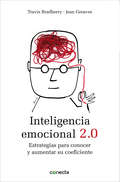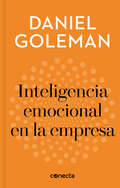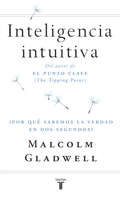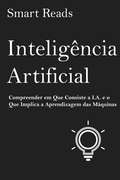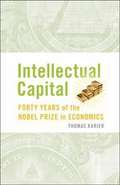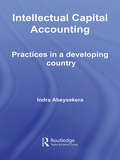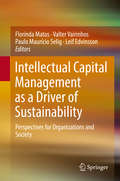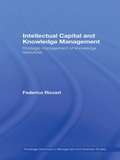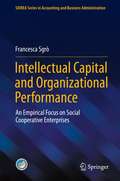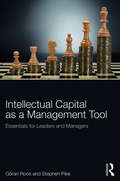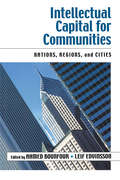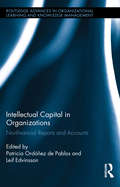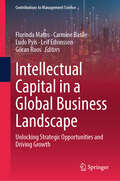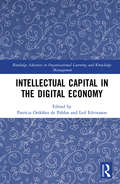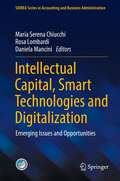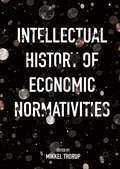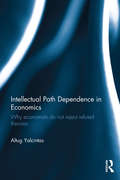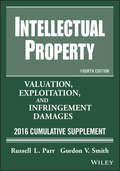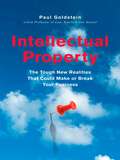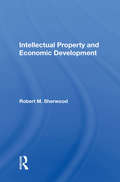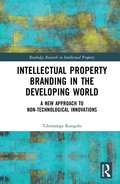- Table View
- List View
Intel: Strategic Decisions in Locating a New Assembly and Test Plant (B)
by Kerry Herman Juan AlcacerIn February 2006, Intel has selected the location for its new assembly and test plant. This case discusses why this location was chosen from the list of possibilities introduced in "Intel: Strategic Decisions in Locating a New Test and Assembly Plant (A)."
Inteligencia emocional 2.0: Estrategias para conocer y aumentar su coeficiente
by Travis Bradberry Jean GreavesLa inteligencia emocional es el factor más importante para el éxito profesional y la excelencia personal. Todos somos conscientes de que la inteligencia emocional es un factor crítico en el éxito profesional y personal. Pero conocer la inteligencia emocional no es lo mismo que saber cómo emplearla para mejorar y avanzar profesionalmente. Inteligencia emocional 2.0 desarrolla un programa paso a paso con 66 propuestas prácticas para potenciar su inteligencia emocional y mejorar cuatro tipos de habilidades básicas: el autoconocimiento, la autogestión, la conciencia social y la gestión de las relaciones. Al mismo tiempo, el libro ofrece al lector la oportunidad de conocer su coeficiente emocional y aprovechar así, de modo individualizado, los consejos de los autores. Los expertos opinan:«La inteligencia emocional es una habilidad muy importante para el éxito personal y profesional. Este libro es excelente, y su método, puntero. Lo recomiendo encarecidamente.»Ken Blanchard, coautor de El directivo al minuto «Este libro proporciona abundantes pautas y recomendaciones para potenciar su inteligencia emocional. Los investigadores han demostrado que el coeficiente emocional es más importante que el coeficiente intelectual.»Stephen R. Covey, autor de Los 7 hábitos de la gente altamente efectiva «Inteligencia emocional 2.0 explica de forma sucinta cómo manejar nuestras emociones con creatividad y emplear nuestra inteligencia de manera positiva.»El Dalai Lama «Si usted desea transformarse en un verdadero líder resonante, este libro le ofrece la posibilidad de cambiar no solo su carrera profesional sino también sus relaciones personales.»Regina Sacha, vicepresidenta de Recursos Humanos, FedEx Custom Critical
Inteligencia emocional en la empresa (Imprescindibles)
by Daniel Goleman<P>¿Qué distingue a los grandes líderes de los que son solo buenos? Según Daniel Goleman, no es el cociente intelectual o las aptitudes técnicas, sino la inteligencia emocional, cinco habilidades que permiten a los mejores líderes maximizar su rendimiento y el de sus seguidores: conciencia de uno mismo, autogestión , motivación, empatía y habilidad social. Y todos podemos mejorar esas aptitudes por medio de la persistencia, la práctica y las valoraciones de colegas o formadores. Muchos directivos suponen de forma equivocada que el estilo de liderazgo es consecuencia de la personalidad y no una elección estratégica. <P>Hay seis estilos de liderazgo básicos y cada uno de ellos deriva de diferentes competencias de la inteligencia emocional. Cuantos más estilos domine un líder, mejor. Poder elegir entre los estilos autoritario, afiliativo, coercitivo, pionero, democrático y formativo cuando lo requieran las circunstancias genera el mejor clima en una organización y optimiza el negocio. Los «Imprescindibles» de Conecta, en colaboración con Harvard Business Review, permiten acceder a las grandes ideas de los autores de referencia que inspiran a directivos y profesionales. <P>Este volumen reúne los textos «Liderazgo que da resultados» y «¿De qué está hecho un líder?» de Daniel Goleman, autor de Inteligencia emocional y El líder resonante crea más (Debolsillo, 2010), entre otras obras.
Inteligencia intuitiva: ¿Por qué sabemos la verdad en dos segundos?
by Malcolm Gladwell¿Por qué algunas personas son brillantes tomando decisiones y otras son torpes una y otra vez? ¿Por qué algunos siguen su instinto y triunfan, mientras que otros acaban siempre dando un paso en falso? En este libro revolucionario, el periodista estadounidense Malcolm Gladwell nos explica cómo pensamos sin pensar, de dónde proceden las decisiones que parece que tomamos en dos segundos, pero que no son tan simples como aparentan. ¿Por qué algunas personas son brillantes tomando decisiones y otras son torpes una y otra vez? ¿Por qué algunos siguen su instinto y triunfan, mientras que otros acaban siempre dando un paso en falso? ¿Cuál es el funcionamiento real del cerebro en el trabajo, en clase, en la cocina o en la cama? ¿Y por qué las mejores decisiones suelen ser las más difíciles de explicar? Gladwell nos presenta a un psicólogo que ha aprendido a predecir si un matrimonio puede durar con sólo observarles unos minutos; a un entrenador de tenis que sabe cuándo un jugador hará doble falta antes incluso de que la raqueta toque la bola; a un experto en antigüedades que reconoce una falsificación de un solo vistazo. Este libro revela que quienes son buenos tomando decisiones no son aquellos que procesan más información o que dedican más tiempo a deliberar, sino aquellos que han perfeccionado el arte de hilar fino, de extraer los pocos factores que realmente importan a partir de una cantidad desmesurada de variables. Por medio de la neurología y la psicología, y exhibiendo todo el esplendor del que este autor es capaz, Inteligencia intuitiva cambia nuestra forma de ver las decisiones que tomamos. Nunca más volverás a pensar en pensar de la misma manera. Reseñas:«Un mago en los libros de autoayuda. Con más de 10 millones de ejemplares vendidos, Malcolm Gladwell es uno de los principales escritores motivacionales, gurú del éxito y analista de "estrategias para triunfar". La clave del éxito, Inteligencia intuitiva, Lo que vio el perro y Fuera de serie son libros que ejecutivos y líderes de todo tipo devoran en los aeropuertos.»La Gaceta de los negocios «¿Debería comprar este libro? Es probable que ya intuya la respuesta.»Independent on Sunday «Si Gladwell tiene razón, comprarán este libro. Y eso confirmará su tesis.»Stephen Bayley, The Guardian «Confíe en mi intuición: si compra este libro quedará encantado.»The New York Times «Convincente y diabólicamente inteligente.»Evening Standard «Brillante. Las implicaciones para los negocios, por no hablar del amor, son inmensas.»The Observer «Fantástico. Este maravilloso libro debería ser de lectura obligada.»The New Statesman «Sencillamente este libro podría cambiar tu vida.»Esquire
Inteligência Artificial
by Patrícia Pinto Smart ReadsOs Empreendedores Elon Musk, Stephen Hawking e Bill Gates, proclamaram a Inteligência Artificial como uma possível ameaça no futuro, caso o Homem não faça uso desta tecnologia com sabedoria. Será verdade? Será possível criar, muito em breve, uma programação que dê um raciocínio e emoções aos dispositivos da Inteligência Artificial? Será, até mesmo, possível termos um candidato tipo-humano, projetado pela I.A, a concorrer às eleiçóes presidênciais no futuro? Estas são as questões e ideologias a ser abordadas no âmbito da I.A e foram aprofundadas no livro: “Inteligência Artificial: Compreender Em Que Consiste a I. A. e O Que Implica a Aprendizagem Das Máquinas”. Este livro foi elaborado de forma a dar uma visão geral e concisa acerca dos temas relacionados com o início da Era das ‘máquinas inteligentes’ e sobre a nossa abordagem atual dos tempos moderna, assim como o impacto das novas tecnologias no futuro e na existência da humanidade. Género: COMPUTADORES / Processamento de Dados Género Secundário: NEGÓCIOS & ECONOMIA / Geral. Línguas: Inglês, Português, outras versões poderão estar disponíveis. Palavras-chave: Inteligência Artificial, I.A, Aprendizagem das Máquinas, a Inteligência das Máquinas, Tecnologias, Avanços Tecnológicos, Computação, Automatização. Número de páginas: 42.
Intellectual Ambition at Harvard Business School: Elton Mayo and Fritz Roethlisberger
by Amram Migdal Jan W. RivkinThis case, set in the 1920s and 1930s, discusses Harvard Business School (HBS) Professors Elton Mayo and Fritz Roethlisberger and their contributions to management research at the School and the rise of the Human Relations Movement in management research. The case focuses on an overview of their research program at the Western Electric Hawthorne Works manufacturing plant between 1927 and 1932, known as the Hawthorne studies, and the resulting insights, publications, course development, and influence on colleagues and research methodology. Brief biographical details of Mayo and Roethlisberger are given, along with a synopsis of early research at HBS and the general history of management studies during the mid-20th century.
Intellectual Asset Valuation
by Lynda M. Applegate Gavin ClarksonDiscusses the shortcomings of the current "rules of thumb" for intellectual asset valuation in the context of intellectual property licensing transactions. As an alternative to the present scheme, this note proposes quantitative methods for such valuations in order to better inform the parties negotiating the elements of an IP transaction.
Intellectual Capital
by Thomas KarierThere is arguably no award more recognized in the academic and professional worlds than the Nobel Prize. The public pays attention to the prizes in the fields of economics, literature, and peace because their recipients are identified with particular ideas, concepts, or actions that often resonate with or sometimes surprise a global audience. The Nobel Prize in Economic Science established by the Bank of Sweden in 1969 has been granted to 64 individuals. Thomas Karier explores the core ideas of the economic theorists whose work led to their being awarded the Nobel in its first 40 years. He also discusses the assumptions and values that underlie their economic theories, revealing different and controversial features of the content and methods of the discipline. The Nobelists include Keynesians, monetarists, financial economists, behaviorists, historians, statisticians, mathematicians, game theorists, and other innovators. Rich in biographical details, illuminating the modern history of the discipline as a whole, Intellectual Capital allows an audience of lay and professional readers to readily understand the notions that define modern economic science and practice. It pointedly asks, and answers, whether the prizes have been awarded to those economists "who have during the previous year rendered the greatest service to mankind."
Intellectual Capital Accounting: Practices in a Developing Country (Routledge Studies in Accounting)
by Indra AbeysekeraThis book examines and explains the intellectual capital reporting practices, with a human capital focus, of firms located in the developing nation of Sri Lanka. The study ascertains the following: first, to what extent the industry groups, based on the number of shareholders, differ in their ICR practices; and second, to what extent firms in Sri Lanka differ from counterparts in other nations in their intellectual capital reporting practices. An important aspect of this book is looking at the practices from a critical perspective to providing a more balanced view of 'good' and 'bad' effects of intellectual capital. The book meticulously outlines an extensive literature review, research methods, the theoretical perspective, findings with an engaging discussion, and concluding remarks. Indra Abeysekera's fine research project is an impressive contribution to an emerging area of interest throughout academia and industry.
Intellectual Capital Management as a Driver of Sustainability: Perspectives for Organizations and Society
by Leif Edvinsson Florinda Matos Valter Vairinhos Paulo Maurício SeligThe objective of this book is to explore the relationship between intellectual capital management and the sustainable development of organizations and society. To do so, it introduces readers to the topic of intellectual capital in the context of several connected entities such as organizations, cities and regions, sharing insights that both reflect the status quo and demonstrate the need for further action. In closing, the book presents practical cases to verify the impact of intellectual capital management on sustainable and competitive development.
Intellectual Capital and Knowledge Management: Strategic Management of Knowledge Resources (Routledge Advances In Management And Business Studies)
by Federica RicceriIt is widely held that the successful management of knowledge resources within industry creates value. However, how this value is created is less clear. This book explores the management of knowledge resources in organisations. Several of the frameworks which have been created around the world to manage knowledge resources are examined and the book
Intellectual Capital and Organizational Performance: An Empirical Focus on Social Cooperative Enterprises (SIDREA Series in Accounting and Business Administration)
by Francesca SgròThis monograph provides empirical evidence on the relationship between intellectual capital (IC) and organizational performance of social cooperative enterprises (SCEs) that work in the non-profit sector. The author presents a survey of a sample of SCEs located in Italy to identify the main components of IC for SCEs and to investigate the effect of IC sub-dimensions on a firm's performance. The book thus presents new empirical evidence on IC in non-profit organizations along with a revelation of the main value drivers by using the survey method as an IC measurement tool combined with a principal components analysis. Finally, considering the difficulties related to the data gathering process in the non-profit sector and in measuring intangible assets, this book helps in increasing the understanding of IC features with a focus on the hybrid organization as SCEs.
Intellectual Capital as a Management Tool: Essentials for Leaders and Managers
by Göran Roos Stephen PikeAs technology evolves, it can be difficult to maintain a competitive edge. The management of intangible resources like competence, relationships, brands, processes and systems becomes increasingly important in such a world. Intellectual Capital as a Management Tool reviews the evidence to demonstrate where the intellectual capital view of the firm has made major contributions. <P><P>The book introduces an updated version of the Intellectual Capital Navigator as an operational tool to help managers maximise value generation from an organisations portfolio of diverse resources. This tool is the only tool that enables organisations to use the resource based view of the firm in an operational way. The book also discusses future developments of the Intellectual Capital Navigator, increasing its precision around the financial aspects of the organisation. <P><P>The book has broad application across all types of organisations and in all operating environments and is vital reading for managers who want to understand and exploit the importance of managing intellectual capital.
Intellectual Capital for Communities: Nations, Regions, And Cities
by Leif Edvinsson Ahmed BounfourIn the knowledge economy, the value of corporations is directly related to their knowledge and intellectual capital. But broaden the perspective a little wider and you begin to see the possibilities: Think of cities, regions, even entire nations, in addition to the public sector. If intangibles and intellectual capital are important to the private sector, they are also important to the productivity and competitiveness of the public sector, and so to communities and nations as a whole. In this book, Editors Ahmed Bounfour and Leif Edivinsson have brought together the best minds in intellectual capital throughout the world to focus on a new and fertile area of research: measuring and managing the intellectual capital of communities. This is a creative and cutting-edge area of research that has the potential to change how public sector planning and development is done. Once there is a clear way to identify where wealth is created in a given region/nation, this process has the potential to reveal a huge knowledge repository in the public sector with a significant—but idle—potential for collective wealth creation—the wealth of nations in waiting.
Intellectual Capital in Organizations: Non-Financial Reports and Accounts (Routledge Advances in Organizational Learning and Knowledge Management #1)
by Leif Edvinsson Patricia OrdIn a global competitive economic environment, resources that are scarce or irreplicable are a source of sustained competitive advantage for companies and organizations. Knowledge-based resources are a major and increasing driver of long term competitive advantage. Most accounting standards however do not allow for knowledge-based resource calculations, including the most important of these, intellectual capital. Intellectual capital is the collective knowledge, documented and otherwise, of individuals in an organization. In the absence of accounting standards to numerically evaluate intellectual capital, some institutions have devised their own reports and statements. But why should companies, universities, and research centers measure these resources? How are intellectual capital statements built? How does one set targets, and what indicators should they include? This book reviews the development of the field of intellectual capital reporting, including core concepts, latest developments, the main components of intellectual capital, how a statement is built, and key indicators of each component. It further analyzes experiences from a variety of pioneering companies and institutions around the globe in measuring intellectual capital, including case studies from educational and research institutions, and provides crucial transnational comparisons. Authors Ordóñez de Pablos and Edvinsson examine the challenges and next steps for the harmonization of intellectual capital reports, consider the creation of a special international agency for intellectual capital reporting standards, and evaluate the weaknesses of current standards and how they might be overcome.
Intellectual Capital in a Global Business Landscape: Unlocking Strategic Opportunities and Driving Growth (Contributions to Management Science)
by Leif Edvinsson Göran Roos Florinda Matos Carmine Basile Ludo PyisIn today&’s dynamic global marketplace, intangible assets and Intellectual Capital have become pivotal in determining corporate value and driving strategic success. To remain competitive and innovative, business leaders must not only protect but also effectively leverage intellectual capital. This insightful book explores the transformative power of intellectual capital in shaping business success and societal progress. Combining theoretical insights with practical strategies, it offers readers a comprehensive guide to understanding, building, and sustaining intellectual capital. Through real-world examples and in-depth case studies, the authors demonstrate how organisations can harness intellectual capital to foster innovation, create lasting value, and adapt to the rapidly evolving business landscape. An essential resource for business leaders, strategists, and academics, this book provides the tools and knowledge necessary to thrive in today&’s knowledge-driven economy, while contributing to a better, more sustainable society.
Intellectual Capital in the Digital Economy (Routledge Advances in Organizational Learning and Knowledge Management)
by Pablos Patricia Ordóñez de / Edvinsson LeifThis book presents a global view of digital and knowledge-based economies and analyses the role of intellectual capital, intellectual capital reports and information technology in achieving sustained competitive advantages in the globalized economy. Intellectual Capital in the Digital Economy reviews the state of the art in the field of intellectual capital and intellectual capital reports, exploring core concepts, strengths and weaknesses, gaps, latest developments, the main components of intellectual capital, the main sections of the reports, and indicators of each component. It presents experiences from pioneering companies and institutions in measuring intellectual capital around the world. It incorporates an interdisciplinary and cross-sectorial approach, offering a comparative view of intellectual capital reports elaborated in different regions of the world. This book presents case studies and experiences on the building of intellectual capital reports in organizations. In addition, the book discusses the benefits and challenges of building intellectual capital reports in smart economies and societies. This book is of direct interest to researchers, students and policymakers examining intellectual capital and the knowledge-based economy.
Intellectual Capital, Smart Technologies and Digitalization: Emerging Issues and Opportunities (SIDREA Series in Accounting and Business Administration)
by Daniela Mancini Rosa Lombardi Maria Serena ChiucchiThis book treats intellectual capital, smart technologies, and digitalization processes as levers of corporate competitiveness and global value creation. This book is based on theoretical and practical research output from the STEDIC SIDREA Group. It uses several methodologies to discover features and pillars on intellectual capital such as human capital, relational capital, and structural capital as well as smart technologies such as artificial intelligence, Internet of Things, big data, and digitalization.
Intellectual History of Economic Normativities
by Mikkel ThorupThe book investigates the many ways thateconomic and moral reasoning interact, overlap and conflict both historicallyand at present. The book explores economic and moral thinking as a historicallycontingent pair using the concept of economic normativities. The contributorsuse case studies including economic practices, such as trade and finance andtax and famine reforms in the British colonies to explore the intellectualhistory of how economic and moral issues interrelate.
Intellectual Path Dependence in Economics: Why economists do not reject refuted theories
by Altug YalcintasIs economics always self-corrective? Do erroneous theorems permanently disappear from the market of economic ideas? Intellectual Path Dependence in Economics argues that errors in economics are not always corrected. Although economists are often critical and open-minded, unfit explanations are nonetheless able to reproduce themselves. The problem is that theorems sometimes survive the intellectual challenges in the market of economic ideas even when they are falsified or invalidated by criticism and an abundance of counter-evidence. A key question which often gets little or no attention is: why do economists not reject theories when they have been refuted by evidence and falsified by philosophical reasoning? This book explores the answer to this question by examining the phenomenon of intellectual path dependence in the history of economic thought. It argues that the key reason why economists do not reject refuted theories is the epistemic costs of starting to use new theories. Epistemic costs are primarily the costs of scarcity of the most valued element in academic production: time. Epistemic scarcity overwhelmingly dominates the evolution of scientific research in such a way that when researchers start off a new research project, they allocate time between replicable and un-replicable research. This book is essential reading for anyone interested in the methodology, philosophy and history of economics.
Intellectual Property
by Gordon V. Smith Russell L. ParrUp-to-date, expert guidance and a valuable tool kit for IP valuation Intellectual Property, Valuation, Exploitation, and Infringement Damages provides practical tools and expert clarification for the valuation of intangible assets. This new 2016 Cumulative Supplement contains the latest laws, regulations, and practices surrounding licensing and joint ventures, with practical analytical models that simplify the calculation of royalties and equity splits. As a companion to the comprehensive Intellectual Property, this book provides invaluable guidance toward the investment aspects, business strategies, taxes, and accounting practices involved in intellectual property protection and profit, to help licensing professionals structure optimal arrangements and mitigate risks. Written by leading experts in the intellectual property realm, this guide is a must-have resource for anyone working with intangible assets. Intellectual property is more than a simple profit center; to many owners, it's the cornerstone of their organization, and must be rigorously protected and exploited to the fullest extent. This book provides clear guidance on valuation, which is the foundation of a successful IP strategy. Define the value of intangible assets in real-money terms Examine the business economics of licensing and joint venture strategies Understand the relevant legal, tax, and accounting practices Determine fair royalty rates and equity splits Patents, trademarks, formulas, copyrights, brand names, distribution systems--all fall under the intellectual property umbrella, and each might be the competitive edge upon which a business is built. Intellectual property can cost hundreds of millions of dollars to create, and is often irreplaceable with no substitute or alternative available, making it an organization's most important asset. Protect it properly, and reap every ounce of profit it can produce with the important guidance in Intellectual Property, Valuation, Exploitation, and Infringement Damages, 2016 Cumulative Supplement.
Intellectual Property
by Paul GoldsteinThis book is the first detailed historical account of intellectual property law. In part, it examines why intellectual property law with its subcategories of patents, copyright, designs and trade marks took the shape that it did over the course of the nineteenth century. In addition the authors deal with ways in which the law grants property status to intangibles and describe how the law came to create techniques that enabled it to recognize protectable intangibles, and the inescapable problems that have arisen from their use.
Intellectual Property And Economic Development
by Robert M SherwoodSpeaking very roughly, countries with advanced economies tend to be those displaying intellectual property protection systems in which the public has a basic degree of confidence. Those systems, when they are thought about at all rather than taken for granted, are thought of as reasonably effective in safeguarding innovation and creative expression
Intellectual Property Branding in the Developing World: A New Approach to Non-Technological Innovations (Routledge Research in Intellectual Property)
by Tshimanga KongoloIntellectual Property Branding in the Developing World identifies success stories in the areas of intellectual property (IP) and branding for non-technological innovation in the developing world. The author examines the relationship between IP, branding and innovation to demonstrate that innovation, in general, and non-technological innovation, in particular, must go hand in hand with branding. Branding of non-technological innovations should be a good strategic tool to be used by countries in the developing world mainly in the areas where they have competitive advantages. This book will assist scholars and academics dealing with innovation, branding, and IP issues, providing context and guidance to policymakers from the developing world. It is also relevant to researchers and students in the fields of intellectual property law, commercial law, international law, management, and innovation.
Intellectual Property Issues
by Ulrich Storz Johanna Driehaus Wolfgang FlascheSpringerBriefs in Biotech Patents present timely reports of intellectual properties (IP) issues and patent aspects in the field of biotechnology. This new volume in the series focuses on the particular IP issues of therapeutics, vaccines and molecular diagnostics. The first chapter concentrates on basics principles for protecting antibody compounds. Additional ways to create follow-up protection for antibody therapeutics are also discussed. The second chapter gives an overview of the patent landscape in molecular diagnostics, and discusses issues of patentability with respect to the different technologies and compounds used therein. The third chapter gives a broad overview of areas of law that are particularly relevant to the patenting of peptide vaccines and therapeutic peptides as products and in compositions. The scope of patentable subject matter is discussed, as it has been the focus of much wrangling and debate in the courts.

